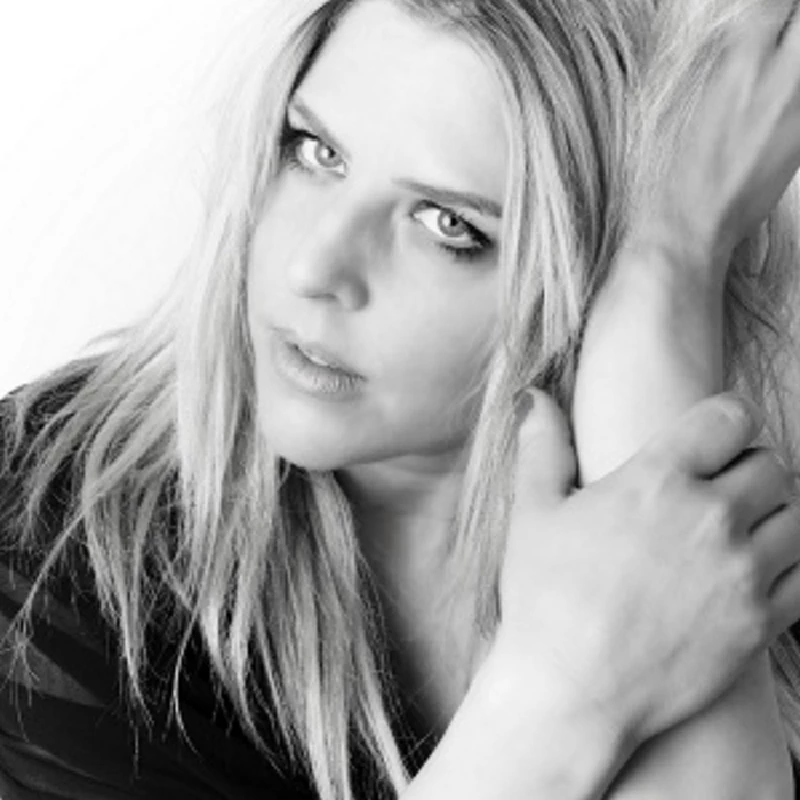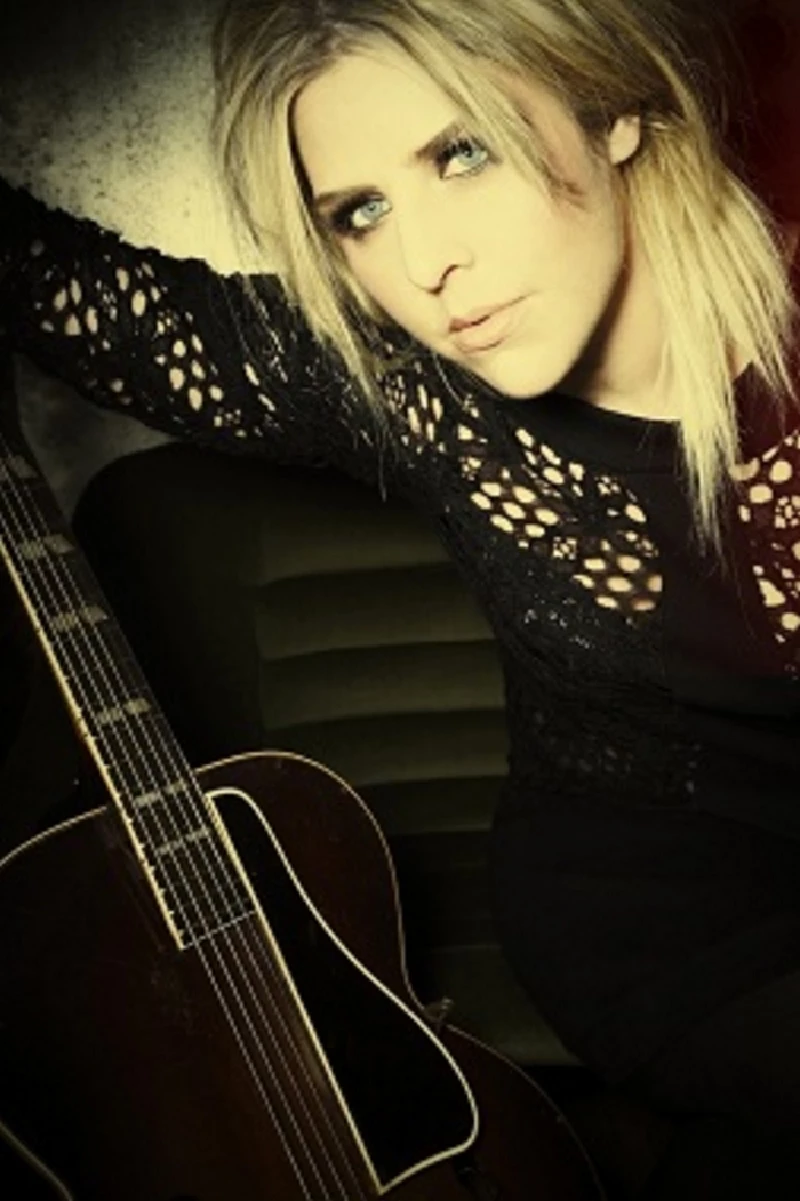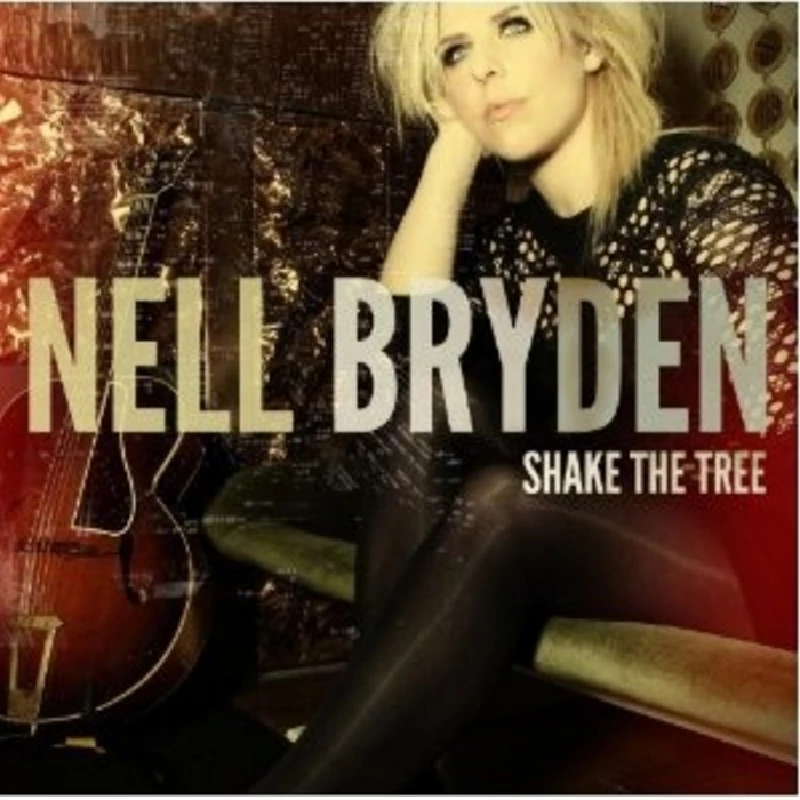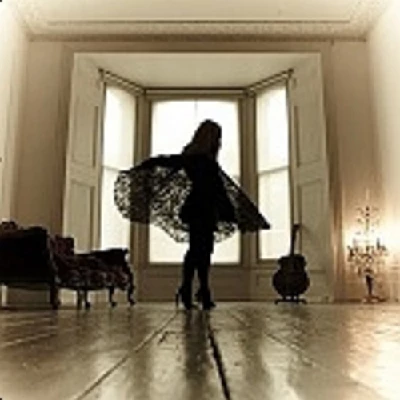Nell Bryden - Interview
by Lisa Torem
published: 23 / 6 / 2012

intro
Brooklyn-bred singer songwriter Nell Bryden reveals her recent desire to co-write, and the back stories behind her latest album 'Shake the Tree' with Lisa Torem
Native Brooklynite, Nell Bryden, is, quite literally, a mover and a shaker, who has explored Thai refugee camps, and Australia, entertained overseas troops and navigated the cultural capitals of the US. In her uplifting second studio album, ‘Shake the Tree’, recorded in her adopted London, the observant singer-songwriter straps her supple vocals around snug originals that blur blues, country and old time music, but which all feature her mellow voice and mature writing skills. In her second Pennyblackmusic interview, she spoke about dreams, transitions and her dedicated DIY philosophy. PB: There’s a real fierceness about ‘Mercy on Me’ from ‘Shake the Tree’. You don’t shy away from dark themes. Explain that one. NB: A 1980’s BBC documentary, ‘Fourteen Days in May’, that I recently came across was about this black man from Alabama, Edward Earl Johnson, on Death Row, who was accused and found guilty of killing a police officer. Alabama in the 80s was still a very segregated area. The whole case horrified a lot of people because he was convicted by an all white jury and there were a lot of unreliable witnesses. The BBC sent over a crew to film what everybody assumed was going to be his exoneration because it was such a terrible case, and in this terrible twist of fate, which happens in our justice system, he wasn’t exonerated. His appeal didn’t go through and he ended up being executed. So instead of this happy, feel good documentary, they ended up filming this horrifying, sad last fourteen days of this man’s life. Afterwards, he was acquitted, but it was post mortem. It’s pretty easy to be desensitized about stories like these because it happens so much, but for some reason seeing it through the British eyes of this BBC documentary made me think about it in a different way. I’ve always loved songs like Bob Dylan’s ‘Hurricane’ and I thought I’d try my hand at that. I’d been listening to classics like Dolly Parton’s‘Jolene’ – songs with real characters and a real moodiness to the music, but still with some pace to them. You want to avoid being too overt because it is a song, and, at the end of the day, it should have some poetic edge to it because people can shut down if they feel they’re being preached to. It’s important to get the music right. Even if you don’t listen to the music and you don’t care what I’m talking about, you can still enjoy the song. So that was my big attempt at trying to follow an absolute genius song like ‘Hurricane’ and I’m sure I fell totally short of his efforts. PB: ‘Buildings and Treetops’, the new single, is equally explosive; a completely different theme and way to look at love. NB: Exactly. That one took me a bit longer because it started out as a chorus I wrote when I was having these recurring dreams about flying. Those are always supposed to be about sex, in your dreams, but I didn’t associate it with that. It represented freedom because I was literally flying over the buildings and the rooftops of various cities in my dreams. It wasn’t a free feeling. I was very fraught. I would be air born and then suddenly feel that I was losing altitude; skimming the tops of buildings and not knowing if I could stay in flight. People would be holding my ankles; all of those chasing dreams that you seem to have when you’re anxious. Then I started to think about what would happen if you had this discrepancy between your night time when you’re dreaming and have this freedom, and you actually can be with someone again that you love, and then the day time where I was thinking about the death of someone you love. You have all these mundane, horrible reminders of the way this life has turned now that they’ve left, things in your daily reality that are reminding you of the loss, and then at night is the only time that you don’t have to think about it anymore. You’re with the person, you’re free and you’re flying above all of that. PB: In ‘Sirens’ you reference distinct, urban landscapes, but, meanwhile, there is this juxtaposition of instrumental ambience. NB: I’m so glad you picked up on that. It’s actually a very subtle thing. We were going for this sonic sound that could be expansive, almost like you’re out on one of those crossroads in the American west and there’s just so much space and it’s very cinematic; the sound of standing in the crossroads in the middle of nowhere. At the same time, I’m a New York girl, born and raised in Brooklyn. I’ve been in Greenwich Village. I’ve been living in London, as well, so it was very much steeped in the lyrics and narrative. PB: Did you discuss this arrangement with your musicians or did it develop organically? NB: Well, it certainly happened organically with the music. You can’t really say, “Play it like this” – but we assembled a group of great musicians, the producer, Mark Taylor (Cher, Lady Gaga-Ed) and my co-writer Patrick Mascall, who plays guitar, became a quasi band mate. PB: Mark also produced Patrick Mascall’s debut with his own band Van Tramp. NB: Right. Patrick came down to Metrophonic, the studio in London where we began to record the album. We were going to start writing for some other people and I realized that, even though he is British, he knew more about American music than most Americans do. It was so cool. We had very in-depth discussions about the sound we were going for because I didn’t want to take any real chances on leaving it to be too organic. I mean, organic is good, but leaving it up to other peoples’ personal tastes, sometimes you don’t get your vision. I didn’t want it to be too much by committee. Our vision was to have this triumvirate of the Daniel Lanois cinematic expansiveness – very reverby, lots of – we called it a “cosmic stew” in the background and then this T-Bone Burnett, very low, easy ambience on the bottom end, a really solid bass sound. Almost like the sound Robert Plant and Alison Krauss got when they did ‘Raising Sand’ or Plant’s ‘Band of Joy’ – this low baritone guitar that sort of rings through everything, and a lot of drones. We were talking about the songwriting of someone like Bruce Springsteen. There are people that I even shudder to put myself in the same sentence as, but you’ve got to shoot for the moon. You’ve got to try for the best. PB: I would describe ‘If I Forget’ as a shot of Doris Day with a Rock Hudson chaser. It takes you back to those classic films. NB: (Laughs) PB: Based on ‘What Does It Take’, your 2009 debut album, that era plays a big part in your emotional makeup. NB: That’s where I came from, and, on the first album, there was a lot more input like that. That song is a nod back to the debut because I didn’t really know what style I wanted to do for the longest time. I was singing jazz standards for many years and, for me, all those Tin Pan Alley and Brill Building songs are so succinct. I was with my cousin last night and we had Gershwin songs stuck in our heads. It never gets old and will never go out of style because there is a fun quirkiness that is written into that style. The bottom line is that they’re a hell of a lot of fun to sing. I almost didn’t include it because it was so different from the other songs. A previous version of it I didn’t end up releasing, but then we completely rerecorded it and I thought, what if someone like Doris Day met the Ramones and did a ‘Pulp Fiction’ soundtrack? PB: ‘Even When a Heart Breaks’ is quite positive though it’s about this tragic breakup. NB: That’s not a complicated song. It’s obviously just a straight-up, pop song, but for me I’ve had so many knocks, like so many people have, in life, and I think you just get more and more interesting with the various scars that you collect. For me, it’s been a life long lesson – it’s not what happens to you, but how you react to it that really shows the true character of a person, seeing the beauty and the pain at the time, and knowing that this is going to enrich your life ultimately, make your heart even stronger because of it, which is often very hard to remember when it’s happening. It’s only something that you get in hindsight, so that’s why that song had to come at the end of the album. PB: Were you initially enthusiastic about co-writing? NB: No. No. I wasn’t at all. I had that slightly only child reaction; I’ve been doing this my whole life. I don’t need someone to show me how to write a song. I don’t want somebody to come in and dilute what I would be saying on my own. I’d written all of my last album, so it was almost like an ego thing. I was so resistant to it, and then I almost hit a wall. Metrophonic is not a factory, because everybody there is such a wonderful person, but they churn out a lot of pop tunes for a lot of big pop acts. They asked me to play one of my songs, so I did and they said, ‘Why don’t you try co-writing?’ The reason I got into it was that I thought I was co-writing for other artists, so this was a way for me to trick my ego into being okay with the idea. As soon as we met, Pat and I were asked to write for a horribly dull group, which would have made us feel soulless at the end of the process. We ended up, instead, spending the entire day talking about Willie Nelson, Dolly Parton and Patsy Cline. That was a whole day wasted – but I think we wrote our first song that day, ‘Couldn’t Love You More’ – it came out of our mutual love of country. Frankly, in the UK, it’s sort of a dirty word in a lot of circles because people hear country and they think modern Nashville, and that’s never been what I’ve been talking about. I’m talking about alt. country and really, really old school stuff -- from the songwriting perspective, they just write such great songs. It wasn’t about the sound so much as about writing really well crafted songs. So Patrick really gave me a shot in the arm and we started writing a whole bunch of songs. Before we knew it we thought we might be writing for my album. Pat would drive down there to do various sessions with other people, drive back with Mark at the end of the day and play him a CD, very casually. We certainly weren’t trying to pitch Mark to do the album, but Mark said they were great and when you get forty of them, let’s talk. We just kept writing and it all came together. PB: Recording in London was a jump. NB: I know. The last one was recorded in New Orleans and New York. I always figured to get my sound I needed American players, but the reality is that I’ve spent so much time in England the last five years, I knew more people over there. I had more of a network and I wanted to do something that would reflect what I was listening to while I was there. It worked out really well because there was a great studio called State of the Ark run by Terry Britten (‘What’s Love Got To Do With It’), which is not fancy looking, but the old gear in it is unbelievable; it has so much warmth to it, so much character. In fact, the board, the desk that they have in the control room, is an old EMI board, one of twelve that the Rolling Stones used when they were out in France. Keith Richards actually name checked this particular board in his biography ‘Life’. You can actually see Mick and Keith had scratched their names into the board, like little graffiti, so it just gave a vibe to this whole place, all of the amps and everything. We recorded a lot of ‘Shake the Tree’ there. PB: When recording in New Orleans, did you internalize those styles? NB: It was such a revelation because you know how much the temptation there is in America to categorize music. Is it blues, jazz, pop, rock? What are we talking about here? I just never thought that way. It has a melody and it’s fun to sing. What’s the problem? That was always challenging in America - you can’t decide what category you fit in, so I threw all of the proverbial rules out of the pan and went to New Orleans. I said, I’m just going to do music, screw off and fall in love with music again. It was a revelation. I was staying off of Frenchman Street. They would have jug band music and then next door a blues band and next door a Latin band and then a rock band. All of the doors were open, and it was spilling out into the street. The cacophony of different sounds was so appealing, it opened my mind. I’m going to stop trying to write something that is going to be popular and I’m just going to write what I feel like singing. And, of course, the irony of life at that point was that it actually started to work for me. PB: As a performer, you went to Iraq twice. The documentary film, ‘Striking a Chord’, chronicled your tour. Given current times, was it daunting to get on that plane? What did you glean from meeting the soldiers, and what inspired you to return? NB: I was terrified to go. I thought, what am I doing? I’m going into a war zone. It was crazy, but the number one thing that I got from it? My perspective has been very limited. Until this point, I had prided myself on being this very open minded, worldly person that knew a lot of different kinds of people, but the reality is, I live in Greenwich Village and I play rock music. That’s a very limited group of people. I’m meeting a lot of people in my world, but the majority of them are not serving in the military. I certainly had no experience in the military before I went over there, and I think I was falling into the trap of something that a lot of people do; equating politics with the actual people that are serving in the troops. PB: That could be a real mistake. NB: That’s a huge mistake. So often the troops get used as pawns in the partisan battles that we have. “I support the troops and I support this and you’re un-American.” As soon I was able to remove the worry that my going over there would be some kind of endorsement of war itself, then I could just start meeting actual people. There are obviously incredibly brave men and women over there, who are away from their families for so long and many of them are on their fifth or sixth deployment. We hear about that in the press, but what was incredible was the human connection. They want to hear songs, meet someone and talk about their family back home. I didn’t actually say all that much, I just listened because they all wanted to tell me about their loved ones, the song they always loved or their dog… Sometimes they would talk about the war and often, if they brought up politics, I’d either listen or shut it down because I wasn’t there to talk about that. NB: So why did I go back a second time? It was such a wonderful experience the first time. I recorded an album, ‘Live From Iraq’, and I just wanted to go back. We pressed a thousand copies and gave them out. We’d do a show and meet people afterwards. For me, this was a once in a lifetime chance. This was a passport into these various worlds that I wouldn’t otherwise get to see. That was a moment where I got to see a side of the troops and Americans, a crazy war zone and the military that I know my friends and family wouldn’t have access to, because they simply weren’t playing shows. I was reserved to go, initially, because I’m not really famous. I felt they only wanted to see the Jessica Simpsons, but this colonel, who has since become a wonderful friend, basically said, “All you’ve got to do is go over there, be yourself and meet people. They’re going to be so grateful that you took the time to come over there,” so I got past the fact that they never heard my music and don’t know who I am. It was good because everybody needs reminding that it’s often not about their immediate circle and world; it’s really important to go out there and broaden your horizons. PB: If you could literally shake the trees, what do you wish would fall from the branches? NB: Half the time I’m going to shake the branches, hoping that it works. Of course, I want the creature comforts in life, but the main things? I just want people to hear this music. My dream since I was five was to look out at huge audiences, play with a band, see everybody have a good time or picture someone driving along in their car - a song comes on the radio, they don’t know who I am, but somehow it makes them have a different perspective in their day; something that changes them, so I’m interested in those moments happening on, hopefully, a global scale. I hope it does well in the UK and comes into the US. There are other countries that I could go into. I’m kind of a natural traveller, so success would be continuing to travel. I know this sounds a bit Pollyanna, but I used to torture myself earlier in my life because I was never really satisfied at where I was at the time; driving to get somewhere else, a very A type New Yorker. I’m just not okay, now, I need more. I feel a bit more settled right now and I think this album is a good expression of me feeling more mature, and a bit more settled because I’m really trying to just be happy with where I am right now so “shaking the tree”, has to be, something that, just in and of itself, is a good activity because you’re getting involved, and you’re just not waiting around for something to happen. Your life won’t be handed to you. You need to actually, literally, go out there, do it yourself and make it happen. PB: Thank you.
Band Links:-
https://www.facebook.com/nellbrydenmusichttp://nellbryden.com/
https://twitter.com/NellBryden/
https://www.youtube.com/user/nellbryden
https://plus.google.com/100421838025682400956
https://www.instagram.com/nellbryden/
Picture Gallery:-


soundcloud
reviews |
|
Buildings and Treetops (2012) |

|
| Heartbreaking first single from her forthcoming second album for fiery-voiced New York singer-songwriter, Nell Bryden |
most viewed articles
current edition
Carl Ewens - David Bowie 1964 to 1982 On Track: Every Album, Every SongArmory Show - Interview with Richard Jobson
Bathers - Photoscapes 1
Colin Blunstone - Thalia Hall, Chicago, 16/7/2025
Visor Fest - Valencia, Spain, 26/9/2025...27/9/2025
Billie Eilish - O2 Arena, London, 10/7/2025
John McKay - Interview
Robert Forster - Interview
Loft - Interview
the black watch - Interview
previous editions
Heavenly - P.U.N.K. Girl EPManic Street Preachers - (Gig of a Lifetime) Millennium Stadium, Cardiff, December 1999
Oasis - Oasis, Earl's Court, London, 1995
Paul Clerehugh - Interview
Trudie Myerscough-Harris - Interview
Beautiful South - Ten Songs That Made Me Love...
Pixies - Ten Songs That Made Me Love...
Doris Brendel - Interview
Prolapse - Interview
Simon Heavisides - Destiny Stopped Screaming: The Life and Times of Adrian Borland
most viewed reviews
current edition
Amy Macdonald - Is This What You've Been Waiting For?Sick Man of Europe - The Sick Man of Europe
Phew, Erika Kobayashi,, Dieter Moebius - Radium Girls
Alice Cooper - The Revenge of Alice Cooper
Davey Woodward - Mumbo in the Jumbo
Lucy Spraggan - Other Sides of the Moon
Blueboy - 2
Cynthia Erivo - I Forgive You
Vinny Peculiar - Things Too Long Left Unsaid
Philip Jeays - Victoria
Pennyblackmusic Regular Contributors
Adrian Janes
Amanda J. Window
Andrew Twambley
Anthony Dhanendran
Benjamin Howarth
Cila Warncke
Daniel Cressey
Darren Aston
Dastardly
Dave Goodwin
Denzil Watson
Dominic B. Simpson
Eoghan Lyng
Fiona Hutchings
Harry Sherriff
Helen Tipping
Jamie Rowland
John Clarkson
Julie Cruickshank
Kimberly Bright
Lisa Torem
Maarten Schiethart